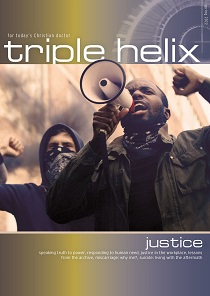Whatever
Cross-centred ethics that point to Jesus
Giles Cattermole
- CMF, 2022, £7.50, 110pp, ISBN: 9780906747834
- Reviewed by Matt Lillicrap, Pastor, Hope Community Church, Cambridge
How do we know the right or wrong thing to do? That question has vexed and perplexed humanity for centuries, keeping philosophers and ethicists, religious leaders and university professors employed.
But it's not confined to the ivory towers of philosophy and academia. It confronts healthcare workers at almost every working moment. Meanwhile, it raises its head at times in all our lives, often in uncomfortable ways.
Christian responses to ethical questions can be shallow. We want direction from God, so we search for a 'word from the Lord.' Armed with something like that, we feel we can move on, leaving discomfort behind.
Where we don't find a clear answer, we follow the status quo, whether spelt out in ethical guidelines or demonstrated by the currents and fashions of culture.
Giles Cattermole is content to let the uncomfortable question hang in the air. Whatever seeks to cut through overly simplistic approaches to ethics. Ethics, he argues, has as much to do with the (often) little decisions of our days as with parliamentary and societal debates about the value of human life.
This is because these decisions and the world in which they are taken have the same root. In God's world, God's design is central. Thus, 'Christian ethics starts by knowing God's character and then responding to what he's done for us in repentance and faith, living lives that glorify God.'
This book explores that idea, examining it from one angle after another. What emerges is a vision of cross-shaped, Christ-centred ethics in which we are encouraged to allow the cross to shape our decisions.
This is not a simplistic approach, drawing up black and white principles as though the world and our decisions are without colour or complexity. Giles draws on the categories of worship, wisdom, and witness. We are to define our ethics by worship as we submit and relate to God. We let wisdom guide us as we understand God's world as it truly is, yielding witness as we live in God's world as God's people.
With practical examples, many drawn from the world of healthcare, this book will prompt readers to bring the whole of Scripture to bear on ethical questions. It will undoubtedly help healthcare professionals and students but is also highly recommended to anyone thinking through how we live for Christ in a complex world.
Through a Glass Darkly
Journeys through science, faith & doubt
Alister McGrath
- Hodder & Stoughton, 2020, £9.99, 225pp, ISBN: 9781529327625
- Reviewed by Patricia Wilkinson a GP in East Lancashire
This is probably Alister McGrath's final book. It is a memoir of his journey to faith from an atheist scientist to a Christian theologian, how he could balance science and religion, and the people who influenced his thinking. Although I was aware of the author, I don't recollect reading any of his books. So, ironically, this was a useful introduction.
Overall, it was an interesting book, particularly the reports of the discussions with Mary Midgely. These covered how and why science and religion work together, rather than being mutually exclusive. If you haven't read his other books, this is a valuable introduction. If you have, then as McGrath puts it, 'this book explains how my theology textbooks came to be written'.
It is an interesting book for any Christian who is a scientist, and I would include health care professionals in this group. But it would also be helpful for a nonbelieving scientist asking questions about our faith.
Silent Cries
Experiencing God's love after losing a baby
Jonny and Joanna Ivey
- IVP, 2021, £7.42, 176pp, ISBN: 9781789741421
- Reviewed by Alice Gerth, a trainee in anaesthetics
Miscarriage and pregnancy loss are not easy topics to write on. Jonny and Joanna Ivey bravely use their own experience of pregnancy loss at 35 weeks to explore the emotions and questions asked by those experiencing this pain.
This is not an intellectual approach to the question of suffering or what happens to infants when they die. Rather, it is a worked through search for God in the darkness. As such, it provides little by the way of answers, but that is what makes it powerful. Through their experience, you see the pitfalls of Christian platitudes and theological sound bites, alongside the hope of the gospel. Jonny, in particular, explores how misapplying theology can result in burdens that aren't his to carry. For instance, the idea that suffering refines us in darker moments led him to ask, would our baby still be here if I had been more refined?
Using this approach challenges those in pastoral roles to be comfortable not having the answers. Instead, it encourages us to sit with the grieving, pointing them to God's love. It also warns against the idea that you ever 'move on' from grief. Instead, you carry it with you, but its impact can become less devastating over time.
This book will build empathy in those who have not experienced pregnancy loss but support those who have. It helps those going through the loss to know their experience is shared and their questions are valid, even if they cannot be answered. It is a raw lament saturated with the gospel. It is an emotional but essential read for the church and Christians in the caring professions.
The Bible and Mental Health
Towards a Biblical Theology of Mental Health.
Ed Christopher CH Cook and Isabelle Hamley
- SCM press, 2020, £25, 256pp, ISBN: 9780334059776
- Reviewed by David Smithard, Consultant in Geriatric Medicine at Lewisham and Greenwich NHS Trust, a Visiting Professor at the University of Greenwich, and is the Triple Helix Editor.
Exploring the intersection of mental health and Scripture, this is a multi-authored, multidisciplinary book that covers many fields, including biblical studies and psychiatry. Given the number of authors, there are several approaches taken. The contributors do not attempt to provide all the answers but to explore the relevance of the Scriptures to mental health. The book is separated into three sections: Biblical Theology, Biblical Case Studies, and Practical Focus.
Some sections of the book are easier to read than others. I found the first chapter 'Narrative, Meaning Making and Mental Health' particularly challenging.
The editors suggest that it is a book for pastors, teachers, vicars, chaplains, and for all those involved in caring for others, whether professionally or in a volunteer capacity. They also propose that it is for ordinary church members struggling with questions, and mental health professionals who want to explore how their patients' faith interacts with and can shape their wellbeing. By and large, the book succeeds in these aims, if you can get through the first few chapters. It is a book best dipped into as and when topics come to the fore and not read from cover to cover. A book to have on the shelf or desk that is there when you need it.
Serving two masters?
Probing the tensions between science and faith in the art of healthcare
Paul Coulter
- CMF, 2022, £7.50, 106pp, ISBN: 9780906747841
- Reviewed by Werner J McIlwaine, Retired Physician and Diabetologist and Catalyst Team Leader for Northern Ireland
Paul Coulter considers the position of faith in healthcare over six chapters, each with helpful summaries and questions for individual or group discussion. He treats the subject with care and consideration, being clear without being dogmatic.
Some have suggested that science apart from faith is the only ethical way to treat patients to respect their autonomy. This is a myth that Paul refutes, arguing that science alone cannot answer questions such as what constitutes a human person or what comprises good practice in healthcare. Biomedical science can show what is effective in treating physical illness. The social sciences can help explain what benefits a patient's emotional and social wellbeing. But neither approach can decide which emotional and physical benefits for individual patients we should prioritise. Nor can science resolve the tensions between viewing health from a population perspective (what maximises the health of the most significant number of people) and the individual (what is beneficial for this particular person). In short, medicine needs ethics, but science alone cannot provide this.
Paul ends with practical suggestions for integrating faith and practice. The book is intended for students and practitioners alike in medicine, nursing, and the allied health professions. I cannot recommend it highly enough.
Up from the Ashes
A Syrian Doctor's Story of Sacrifice and Hope
Dr 'A' and Samara Levy
- Hodder & Stoughton, 2021, £13.29, 256pp, ISBN: 9781529358421
- Reviewed by David Smithard, Consultant in Geriatric Medicine at Lewisham and Greenwich NHS Trust, a Visiting Professor at the University of Greenwich, and is the Triple Helix Editor.
Dr A is a Christian who was living in Syria when the civil war began. Dr A's family are Christian. His father was in the army, imprisoned for maintaining his integrity in the face of extreme pressure. His father was forced to leave the military, setting up a small grocery shop. The family had little money, but Dr A worked hard, facing adversity as one of the few Christians in various schools in Muslim areas. He eventually became a respected ITU and emergency care doctor. For a brief while, life was comfortable; then the 'world fell apart'.
There are several strands to Dr A's story, providing an alternative insight into the horrors of the Syrian civil war, one that the West did not report. It is a story of courage, of refusing to leave his nation like so many of his fellow countrymen and family, and choosing instead to stay and help his people until it became impossible. It is a story of his friendship with a British woman (Samara Levy) and her church and their prayer support for him and his work. And lastly, it is a story of self-discovery and his encounter with and dependence upon the real Jesus.
Dr A remains in Syria, determined to help rebuild his nation. As he says, 'But through the love, support and prayers of many faithful hearts, in Syria, in the UK, and around the world, we are certain that God will provide.'































